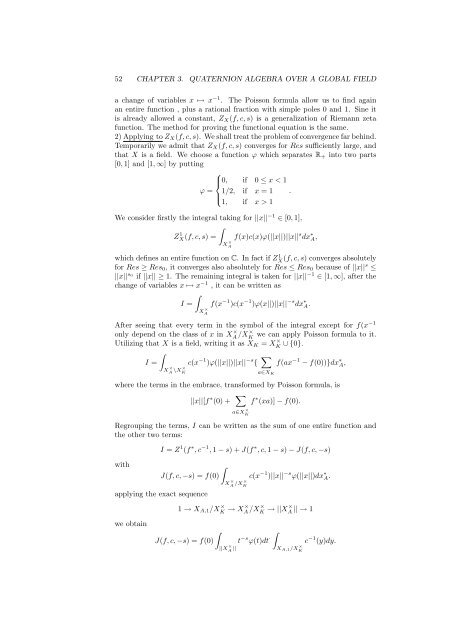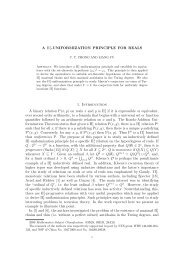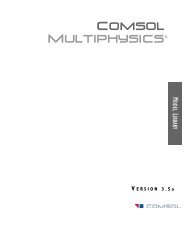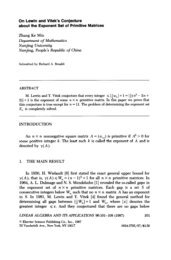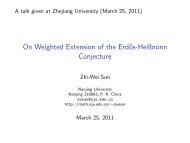The Arithmetic of Quaternion Algebra
The Arithmetic of Quaternion Algebra
The Arithmetic of Quaternion Algebra
Create successful ePaper yourself
Turn your PDF publications into a flip-book with our unique Google optimized e-Paper software.
52 CHAPTER 3. QUATERNION ALGEBRA OVER A GLOBAL FIELD<br />
a change <strong>of</strong> variables x ↦→ x −1 . <strong>The</strong> Poisson formula allow us to find again<br />
an entire function , plus a rational fraction with simple poles 0 and 1. Sine it<br />
is already allowed a constant, ZX(f, c, s) is a generalization <strong>of</strong> Riemann zeta<br />
function. <strong>The</strong> method for proving the functional equation is the same.<br />
2) Applying to ZX(f, c, s). We shall treat the problem <strong>of</strong> convergence far behind.<br />
Temporarily we admit that ZX(f, c, s) converges for Res sufficiently large, and<br />
that X is a field. We choose a function ϕ which separates R+ into two parts<br />
[0, 1] and [1, ∞] by putting<br />
⎧<br />
⎪⎨ 0, if 0 ≤ x < 1<br />
ϕ = 1/2,<br />
⎪⎩<br />
1,<br />
if<br />
if<br />
x = 1<br />
x > 1<br />
.<br />
We consider firstly the integral taking for ||x|| −1 ∈ [0, 1],<br />
Z 1 �<br />
X(f, c, s) = f(x)c(x)ϕ(||x||)||x|| s dx ∗ A,<br />
X ×<br />
A<br />
which defines an entire function on C. In fact if Z1 X (f, c, s) converges absolutely<br />
for Res ≥ Res0, it converges also absolutely for Res ≤ Res0 because <strong>of</strong> ||x|| s ≤<br />
||x|| s0 if ||x|| ≥ 1. <strong>The</strong> remaining integral is taken for ||x|| −1 ∈ [1, ∞], after the<br />
change <strong>of</strong> variables x ↦→ x−1 , it can be written as<br />
�<br />
I =<br />
X ×<br />
A<br />
f(x −1 )c(x −1 )ϕ(x||)||x|| −s dx ∗ A.<br />
After seeing that every term in the symbol <strong>of</strong> the integral except for f(x−1 only depend on the class <strong>of</strong> x in X ×<br />
A /X× K we can apply Poisson formula to it.<br />
Utilizing that X is a field, writing it as XK = X ×<br />
K ∪ {0}.<br />
�<br />
I = c(x −1 )ϕ(||x||)||x|| −s { �<br />
f(ax −1 − f(0))}dx ∗ A,<br />
X ×<br />
A \X× K<br />
a∈XK<br />
where the terms in the embrace, transformed by Poisson formula, is<br />
||x||[f ∗ (0) + �<br />
f ∗ (xa)] − f(0).<br />
a∈X ×<br />
K<br />
Regrouping the terms, I can be written as the sum <strong>of</strong> one entire function and<br />
the other two terms:<br />
with<br />
I = Z 1 (f ∗ , c −1 , 1 − s) + J(f ∗ , c, 1 − s) − J(f, c, −s)<br />
�<br />
J(f, c, −s) = f(0)<br />
X ×<br />
A /X×<br />
c(x<br />
K<br />
−1 )||x|| −s ϕ(||x||)dx ∗ A.<br />
applying the exact sequence<br />
we obtain<br />
1 → XA,1/X ×<br />
K → X×<br />
A /X× K<br />
→ ||X× A || → 1<br />
�<br />
J(f, c, −s) = f(0)<br />
||X ×<br />
A ||<br />
t −s ϕ(t)dt ·<br />
�<br />
XA,1/X ×<br />
c<br />
K<br />
−1 (y)dy.


